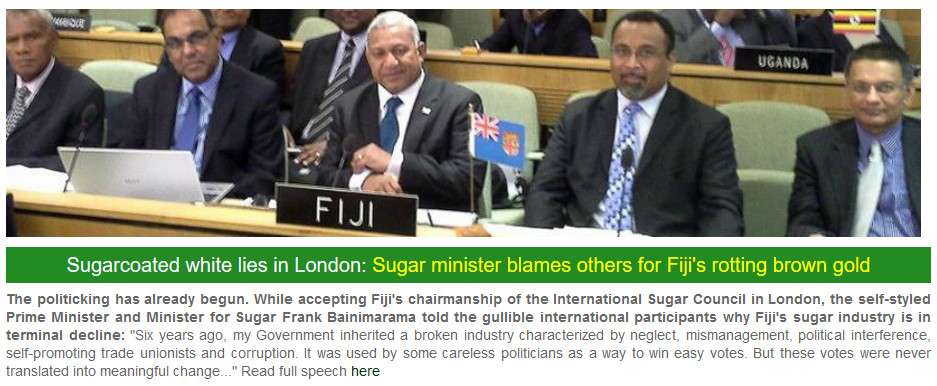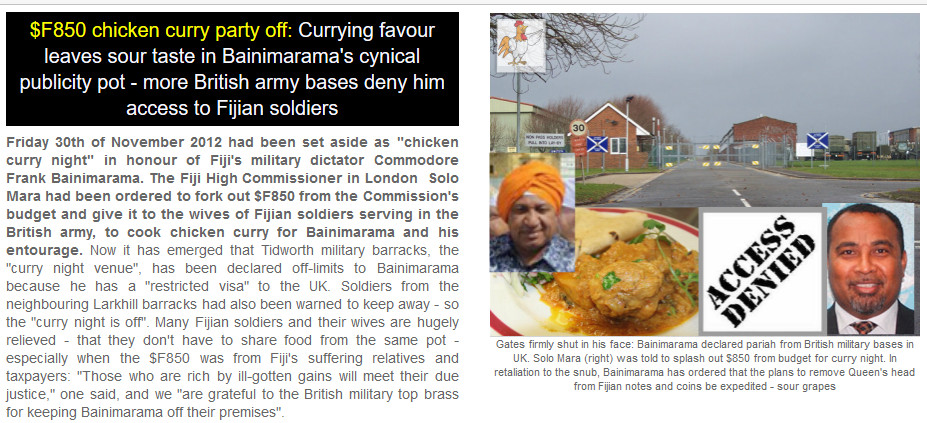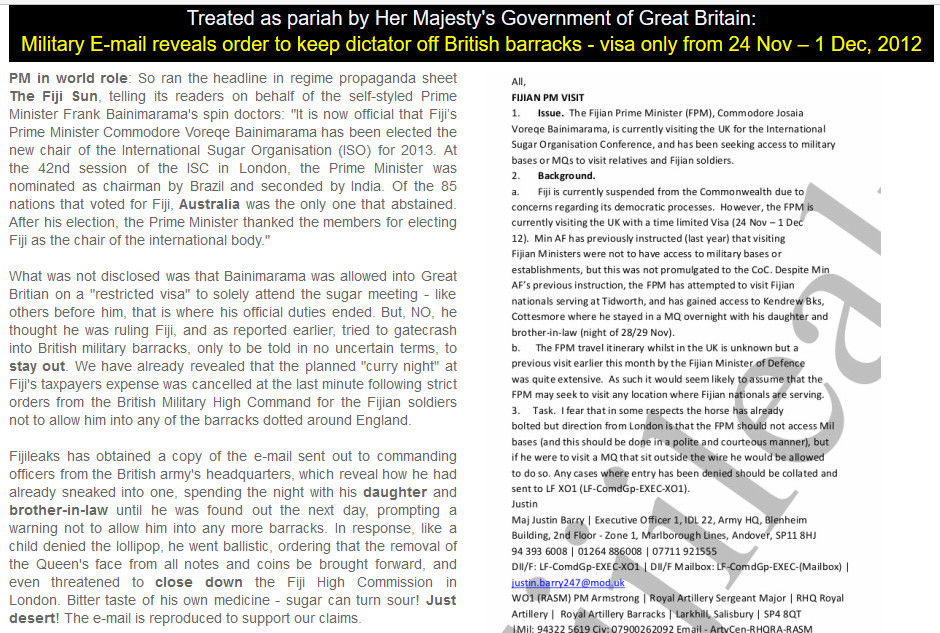An independent and impartial investigation must be immediately instituted into the operations of the financially stricken Fiji Sugar Corporation and its former Executive Chairman Abdul Khan.
This follows announcement that the FSC recorded a loss of $31.7 million for the 2015 financial year after making a profit of $6.9 million in 2014.
Only an independent and impartial inquiry and forensic audit will be able to establish how Mr Abdul Khan has been responsible for running the Corporation for five years as Executive Chairman. As the sole authority in charge of everything including even marketing of sugar, Mr Khan must be held responsible for making FSC technically insolvent and totally dependent on loans guaranteed by Government and the taxpayers of this country.
And Government as the largest shareholder is equally responsible for this disastrous result. Both the Prime Minister and the Attorney General and Minister for Economy have misled Parliament and the nation respectively by claiming FSC and Mr Khan were doing a remarkable job and that the Opposition was trying to politicise the industry.
In his ministerial statement in Parliament on 11th February 2015, the PM and Minister for Sugar said, “…one of the remarkable success stories of the last few years is the remarkable turnaround of FSC…”
“…. The FSC is now able to stand on its own two feet. Government does not need to provide it any direct funding since 2013”.
On 27th May 2015, the AG and then Minister for Finance, while announcing that FSC would top up the 4th cane payment for 2014 season by nearly $8 said in the Fiji Sun newspaper “We are able to do this only because of the tremendous performance of the FSC under its present management especially its Executive Chairman Abdul Khan. We have taken politics out of the industry and given the FSC the guidance and support it needs to properly manage the industry”.
The disastrous financial performance of FSC paints an entirely different picture.
If the PM and AG can claim credit for any good that happens, in this case FSC’s profit in 2014, then they must also, under doctrine of ministerial responsibility, take the responsibility for their abysmal failure in monitoring the performance of FSC under Abdul Khan, which resulted it plummeting from a so called profitable organisation to a colossal financial disaster. This is unprecedented.
That is why we reiterate that Abdul Khan should not have been allowed to quit FSC without an independent investigation. Relinquishing his position immediately with several questions remaining unanswered about both his and the FSC’s performance and the Corporation’s lack of direction during his reign was unacceptable and against good governance in a organisation in which taxpayers have a stake through majority ownership by Government.
For the sake of accountability, transparency and good governance, we call upon the Chairman of FSC to appoint an independent investigation comprising of personnel who are experts in financial and forensic accounting and audit to extensively scrutinise all aspects of FSC’s operations and management practices in the last five years.
Authorised by: -
Professor Biman Prasad
NFP Leader
This follows announcement that the FSC recorded a loss of $31.7 million for the 2015 financial year after making a profit of $6.9 million in 2014.
Only an independent and impartial inquiry and forensic audit will be able to establish how Mr Abdul Khan has been responsible for running the Corporation for five years as Executive Chairman. As the sole authority in charge of everything including even marketing of sugar, Mr Khan must be held responsible for making FSC technically insolvent and totally dependent on loans guaranteed by Government and the taxpayers of this country.
And Government as the largest shareholder is equally responsible for this disastrous result. Both the Prime Minister and the Attorney General and Minister for Economy have misled Parliament and the nation respectively by claiming FSC and Mr Khan were doing a remarkable job and that the Opposition was trying to politicise the industry.
In his ministerial statement in Parliament on 11th February 2015, the PM and Minister for Sugar said, “…one of the remarkable success stories of the last few years is the remarkable turnaround of FSC…”
“…. The FSC is now able to stand on its own two feet. Government does not need to provide it any direct funding since 2013”.
On 27th May 2015, the AG and then Minister for Finance, while announcing that FSC would top up the 4th cane payment for 2014 season by nearly $8 said in the Fiji Sun newspaper “We are able to do this only because of the tremendous performance of the FSC under its present management especially its Executive Chairman Abdul Khan. We have taken politics out of the industry and given the FSC the guidance and support it needs to properly manage the industry”.
The disastrous financial performance of FSC paints an entirely different picture.
If the PM and AG can claim credit for any good that happens, in this case FSC’s profit in 2014, then they must also, under doctrine of ministerial responsibility, take the responsibility for their abysmal failure in monitoring the performance of FSC under Abdul Khan, which resulted it plummeting from a so called profitable organisation to a colossal financial disaster. This is unprecedented.
That is why we reiterate that Abdul Khan should not have been allowed to quit FSC without an independent investigation. Relinquishing his position immediately with several questions remaining unanswered about both his and the FSC’s performance and the Corporation’s lack of direction during his reign was unacceptable and against good governance in a organisation in which taxpayers have a stake through majority ownership by Government.
For the sake of accountability, transparency and good governance, we call upon the Chairman of FSC to appoint an independent investigation comprising of personnel who are experts in financial and forensic accounting and audit to extensively scrutinise all aspects of FSC’s operations and management practices in the last five years.
Authorised by: -
Professor Biman Prasad
NFP Leader
From Fijileaks Archive...What Bainimarama told London sugar talks, 2012
"Six years ago, my Government inherited a broken industry characterized by neglect, mismanagement, political interference, self-promoting trade unionists and corruption. It was used by some careless politicians as a way to win easy votes. But these votes were never translated into meaningful change. So we have set about trying to right these wrongs with a comprehensive series of reforms, but there are still many challenges to overcome."
Mr. Chairman;
Ministers;
Executive Director;
Excellencies;
Distinguished Ladies and Gentlemen.
Bula vinaka and a good afternoon to you.
On behalf of the Government and people of Fiji, I want to express my sincere appreciation to you all for electing Fiji to chair the International Sugar Council for 2013.
This is a great honour for our country.
I pledge that Fiji will do everything possible to advance the cause of this global industry and the millions of ordinary people the world over who depend on sugar for their livelihoods.
They look to us to keep sugar viable, prosperous and sustainable. We must not let them down. I look forward to working closely with you all, over the coming year as we move to address the challenges facing our industry.
I especially look forward to welcoming you to Fiji in June next year for the 43rd Session of the International Sugar Council. Our people are renowned for their hospitality. But I can assure you that the welcome that awaits you all in Fiji in 2013 will be especially sweet.
Ladies and Gentlemen, as we all know, the global Sugar Industry is facing exceptional challenges. World sugar prices have been unstable over the past couple of years. The market has been altered by major shifts in production in a number of key sugar- producing countries, which have drastically decreased the volume of sugar traded internationally.
Within the community of sugar exporters, it has been the small players such as Fiji that are most vulnerable to
the uncertainties and fluctuations of the marketplace.
We need fair and stable prices from our buyers or else we risk having existing developments and investments undone. We could lose potential investment and the long-term viability and sustainability of the industry would be seriously undermined.
Like many other smaller exporters who are represented here today, Sugar is a mainstay of the Fijian economy. It is our second biggest export earner after Tourism. The Industry directly or indirectly supports around 200,000 Fijians in a country of less than 900,000 people. And it remains the single largest source of employment outside the public sector, employing 25% of the Fijian workforce.
A healthy Sugar Industry means a healthy Fiji and a viable and sustainable future for all our citizens, not just those directly employed in the Industry. Six years ago, my Government inherited a broken industry characterized by neglect, mismanagement, political interference, self-promoting trade unionists and corruption. It was used by some careless politicians as a way to win easy votes. But these votes were never translated into meaningful change.
So we have set about trying to right these wrongs with a comprehensive series of reforms, but there are still many challenges to overcome. Cane quality, cane transport, general infrastructure, supply to our mills and the performance of those mills are all issues. We also face an issue that is uniquely challenging in Fiji the renewal of land leases. In the past, there has been a vicious cycle in which landowners are reluctant to renew leases because they cannot extract their rents. And tenants are reluctant to pay rent because there is uncertainty about their leases being renewed.
We need to balance the interests of both parties and make sure that as much land as possible is being put to productive use.
Mine is a reforming Government and as some of you will be aware, these reforms aren’t always universally understood. But all along, we have been determined to see that the common good prevails over sectional interests. A common and equal citizenry, national unity and a level playing field in politics and industrial relations are universal principles and we make no apology for pursuing them.
My Government is giving all Fijians common and equal citizenry for the first time. And in 2014, we will be holding the first Election in Fiji’s history in which the vote of every citizen will carry equal status. We are also sparing no effort to revitalise Fiji’s Sugar Industry. We are trying to be smarter about the way we approach the Industry’s problems. And we are targetting our limited resources more carefully with a view to maximising returns on our investment.
Our long term goal is to increase and diversify production, in order to limit our exposure to the uncertainty and fluctuations in raw sugar prices.
Mr. Chairman,
Ladies and gentlemen;
Beyond the experience of my own country, each of us has our own story to tell and this is why this forum is so important. It’s a place where we can share our experiences, swap ideas, learn about new developments in the Industry and forge new partnerships.
With these words, Mr. Chairman, I again express my gratitude to the ISO fraternity and extend a warm invitation to everyone to attend the 43rd Session of the International Sugar Council in Nadi, Fiji from the third to the seventh of June, 2013.
Whether it is with the ISO, our current chairmanship of the G77 plus China or our peacekeeping operations for the United Nations, Fiji takes its international obligations very seriously.
It is a privilege, not a burden, to serve.
Thank you. Vinaka vakalevu
Ministers;
Executive Director;
Excellencies;
Distinguished Ladies and Gentlemen.
Bula vinaka and a good afternoon to you.
On behalf of the Government and people of Fiji, I want to express my sincere appreciation to you all for electing Fiji to chair the International Sugar Council for 2013.
This is a great honour for our country.
I pledge that Fiji will do everything possible to advance the cause of this global industry and the millions of ordinary people the world over who depend on sugar for their livelihoods.
They look to us to keep sugar viable, prosperous and sustainable. We must not let them down. I look forward to working closely with you all, over the coming year as we move to address the challenges facing our industry.
I especially look forward to welcoming you to Fiji in June next year for the 43rd Session of the International Sugar Council. Our people are renowned for their hospitality. But I can assure you that the welcome that awaits you all in Fiji in 2013 will be especially sweet.
Ladies and Gentlemen, as we all know, the global Sugar Industry is facing exceptional challenges. World sugar prices have been unstable over the past couple of years. The market has been altered by major shifts in production in a number of key sugar- producing countries, which have drastically decreased the volume of sugar traded internationally.
Within the community of sugar exporters, it has been the small players such as Fiji that are most vulnerable to
the uncertainties and fluctuations of the marketplace.
We need fair and stable prices from our buyers or else we risk having existing developments and investments undone. We could lose potential investment and the long-term viability and sustainability of the industry would be seriously undermined.
Like many other smaller exporters who are represented here today, Sugar is a mainstay of the Fijian economy. It is our second biggest export earner after Tourism. The Industry directly or indirectly supports around 200,000 Fijians in a country of less than 900,000 people. And it remains the single largest source of employment outside the public sector, employing 25% of the Fijian workforce.
A healthy Sugar Industry means a healthy Fiji and a viable and sustainable future for all our citizens, not just those directly employed in the Industry. Six years ago, my Government inherited a broken industry characterized by neglect, mismanagement, political interference, self-promoting trade unionists and corruption. It was used by some careless politicians as a way to win easy votes. But these votes were never translated into meaningful change.
So we have set about trying to right these wrongs with a comprehensive series of reforms, but there are still many challenges to overcome. Cane quality, cane transport, general infrastructure, supply to our mills and the performance of those mills are all issues. We also face an issue that is uniquely challenging in Fiji the renewal of land leases. In the past, there has been a vicious cycle in which landowners are reluctant to renew leases because they cannot extract their rents. And tenants are reluctant to pay rent because there is uncertainty about their leases being renewed.
We need to balance the interests of both parties and make sure that as much land as possible is being put to productive use.
Mine is a reforming Government and as some of you will be aware, these reforms aren’t always universally understood. But all along, we have been determined to see that the common good prevails over sectional interests. A common and equal citizenry, national unity and a level playing field in politics and industrial relations are universal principles and we make no apology for pursuing them.
My Government is giving all Fijians common and equal citizenry for the first time. And in 2014, we will be holding the first Election in Fiji’s history in which the vote of every citizen will carry equal status. We are also sparing no effort to revitalise Fiji’s Sugar Industry. We are trying to be smarter about the way we approach the Industry’s problems. And we are targetting our limited resources more carefully with a view to maximising returns on our investment.
Our long term goal is to increase and diversify production, in order to limit our exposure to the uncertainty and fluctuations in raw sugar prices.
Mr. Chairman,
Ladies and gentlemen;
Beyond the experience of my own country, each of us has our own story to tell and this is why this forum is so important. It’s a place where we can share our experiences, swap ideas, learn about new developments in the Industry and forge new partnerships.
With these words, Mr. Chairman, I again express my gratitude to the ISO fraternity and extend a warm invitation to everyone to attend the 43rd Session of the International Sugar Council in Nadi, Fiji from the third to the seventh of June, 2013.
Whether it is with the ISO, our current chairmanship of the G77 plus China or our peacekeeping operations for the United Nations, Fiji takes its international obligations very seriously.
It is a privilege, not a burden, to serve.
Thank you. Vinaka vakalevu






